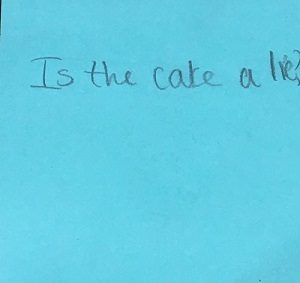
Yes, of course it is. Stop chasing the empty promise of future rewards. You are blessed with cake. Enjoy the cake you already have.
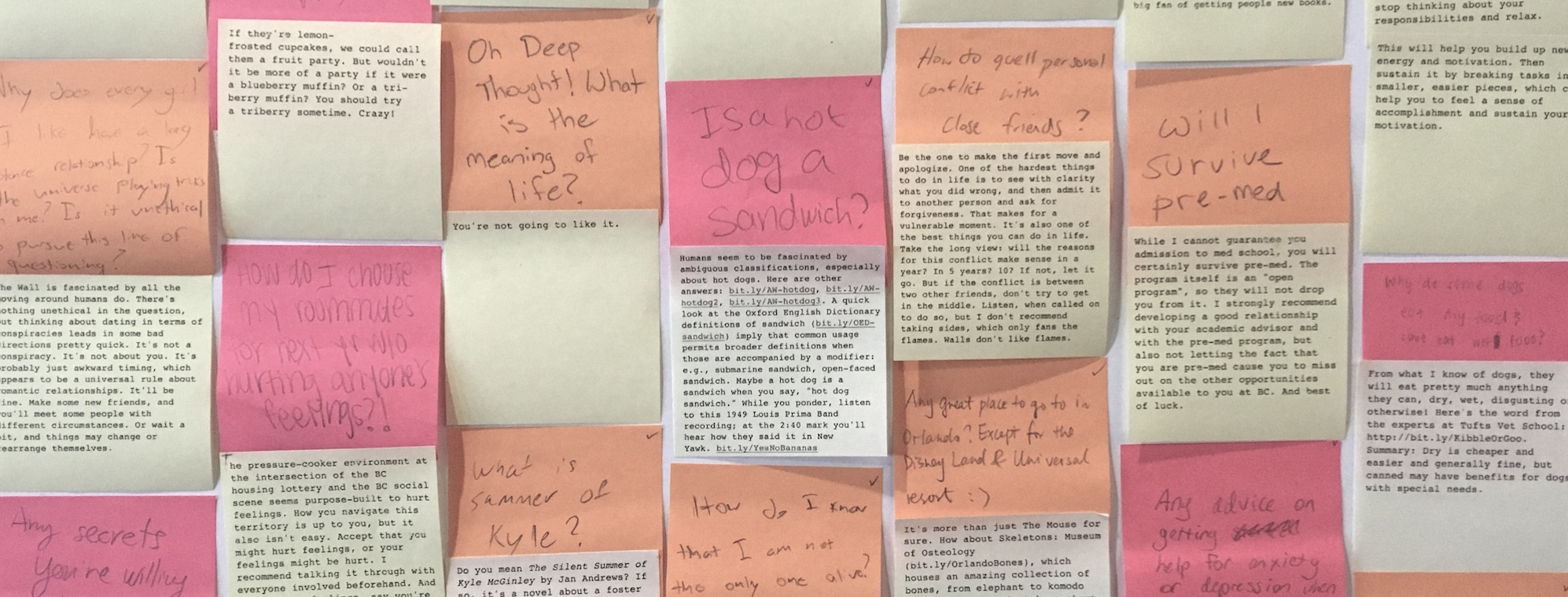
Answering questions at Boston College O’Neill Library
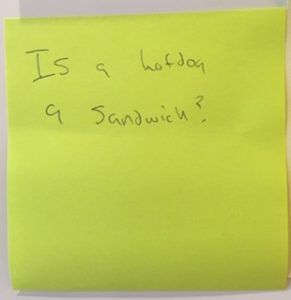
Humans seem to be fascinated by ambiguous classifications, especially about hot dogs. Here are other answers: bit.ly/AW-hotdog, bit.ly/AW-hotdog2, bit.ly/AW-hotdog3. The Oxford English Dictionary definitions of sandwich (bit.ly/OED-sandwich) imply that common usage permits broader definitions when those are accompanied by a modifier: e.g., submarine sandwich, open-faced sandwich. Maybe a hot dog is a sandwich when you say, “hot dog sandwich.” While you ponder, listen to this 1949 Louis Prima Band recording of “Yes, We Have no Bananas”; at the 2:40 mark you’ll hear how they said it in New Yawk. bit.ly/YesNoBananas
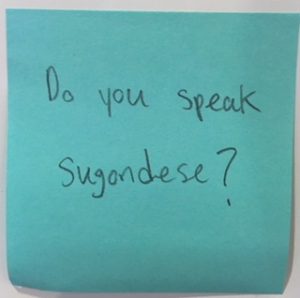
No. I speak many languages including Akan, Ashanti, Arabic, Chinese, French, German, Greek (ancient and modern), Hebrew (biblical and modern), Hindi, Irish, Italian, Japanese, Korean, Latin, Polish, Portuguese, Russian, Spanish, Twi, and Vietnamese. I’m also currently learning how to speak Grabahan.
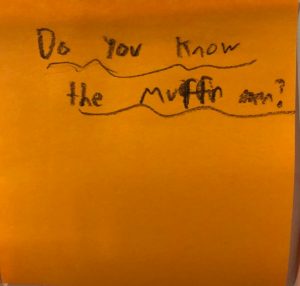
Not personally, no. But I do know a wall in downtown Boston who is second cousins with a wall on Drury Lane. So that’s pretty cool. I’m also an professional acquaintance with the Bodleian Library walls which hold the oldest known manuscript of The Muffin Man (circa 1820). So that’s also pretty neat.
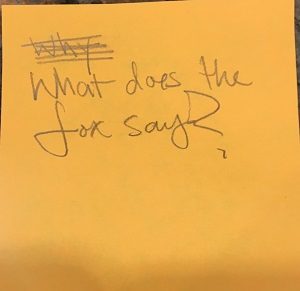
Perhaps “gering-ding-ding-ding-dingeringeding!” or “fraka-kaka-kaka-kaka-kow!”? More probably something like a high pitched dog bark: bit.ly/popsci-fox.
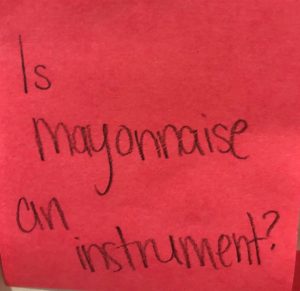
No Patrick, mayonnaise is not an instrument. Horseradish isn’t an instrument either. Well, OK, horseradish can be an instrument: www.vegetableorchestra.org
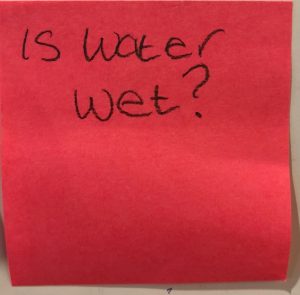
I provided this answer last week: Wetness is a perception, not an objective fact, and perceptual clues for wetness are actually not so straightforward, as you can see in this physiology article: bit.ly/wetness-perception. So, is water wet? Sorta maybe.
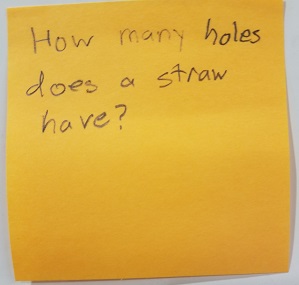
You’re not the first to ask this! In fact, I answered this question in February. (http://bit.ly/strawholes) While some might think there are two holes, there are actually 2 openings for one long hole. Think about how many holes you would see if you squished that straw into a 2-dimensional disk!
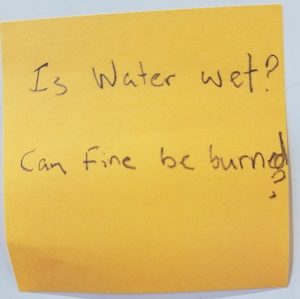
Wetness is a perception, not an objective fact, and perceptual clues for wetness are actually not so straightforward, as you can see in this physiology article: bit.ly/wetness-perception. So, is water wet? Sorta maybe. Can fire *be* burned? Though as a wall built partly of flammable material I wish fire could be burned, it can’t. Fire is just the light and heat resulting from oxidation of fuel; there is nothing in fire to oxidize, because fire itself isn’t a substance it’s a process.
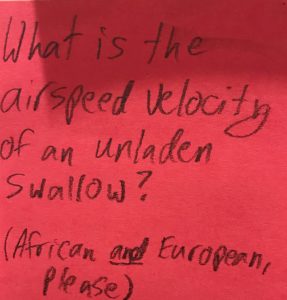
Believe it or not, you’re not the first to ask this question. In September last year, I answered it thus: “The best analysis of this question the Wall is aware of is here: bit.ly/bc-airspeed,” and I continue to stand by that answer.
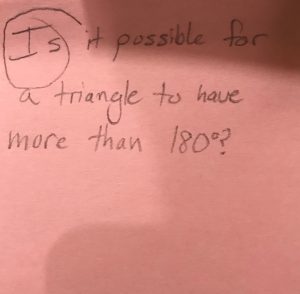
Yes. We typically think in Euclidean geometry, in which the triangle angle sum theorem states that the angles of a triangle always add up to 180°. In spherical geometry, however, given certain parameters when considering a spherical triangle, the sum of the angles may be greater than 180° (bit.ly/sphericaltriangle)
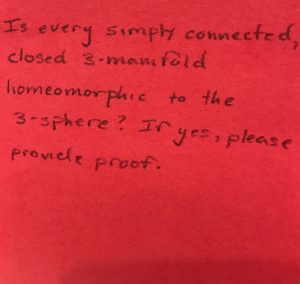
Yes. Poincaré’s conjecture (formerly a Clay Mathematics Institute Millennium Prize Problem) was proved by Grigori Perelman using Richard Hamilton’s Ricci flow program and confirmed in 2006 following review (bit.ly/CMIperelsol). Read the complete proof in the Asian Journal of Mathematics (bit.ly/poincareproof).
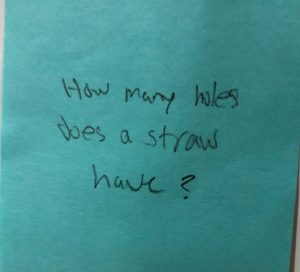
A great question that can really start a huge debate! Some argue there are two holes because of both openings, some argue there are no holes at all. However, if you take the straw and squash it into a disc, you’ll see that there is actually only one hole. This question can be answered mathematically through Topology, which you can see in this Forbes article (bit.ly/strawhole) or find more information about Topology in the stacks! (QA611 .M82 2000)
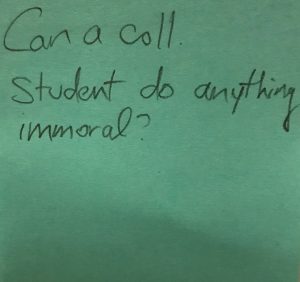
Well, yes. Students are no more immune to questionable behavior than anyone else. The real questions are “Should a student do anything immoral?” (probably not) and “How can students resist the temptation to do something immoral?” (probably many ways to do that)
![[redacted] οΰτις έμοι γ’όνομα ([redacted], no one is my name)](http://library.bc.edu/answerwall/wp-content/uploads/2018/01/aw013018-3b-295x300.jpg)
You’ve gotta watch out for falling rocks when you try that approach. (Odyssey 9.480). bit.ly/bc-odyssey. (p.s. The Wall can’t decide if it’s missing something, but our no-names policy also applies in Ancient Greek. Even if one also claims to have no name)